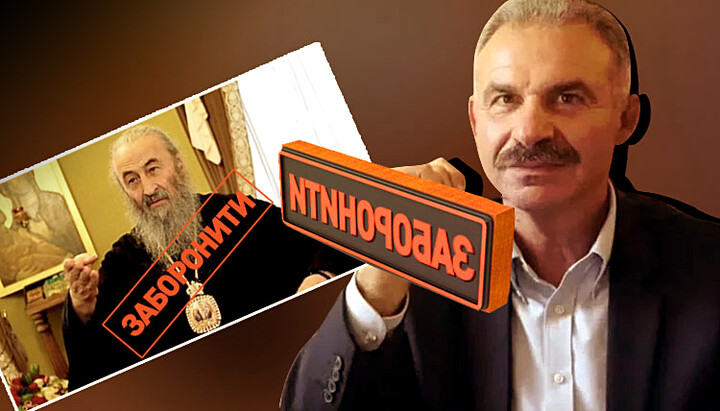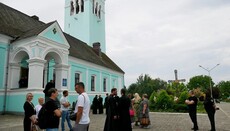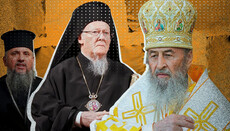Where Yelensky deceives in the case of banning UOC – and, above all, why?

In an interview on the Viche YouTube channel, Viktor Yelensky explained how and why Ukraine intends to ban the UOC. He told the story elegantly – but disingenuously. In what way, precisely?
On 12 September 2025 the YouTube channel Viche (formerly the TRK Hlas channel) published an interview with the head of State Service of Ukraine for Ethnopolitics and Freedom of Conscience (DESS), Viktor Yelensky. There he strove to portray the UOC as obstinate obscurantists clinging to trifles that, in Yelensky’s view, could very easily be set aside so that all state persecution would cease. The head of DESS spoke convincingly, much as he used to inveigh against “Zionism” and “Jewish clericalism” in Soviet times. His host, Ilona Sokolovska – formerly editor-in-chief of the pro-Moscow “Hlas” – asked perfectly complementary questions, which helped him greatly.
The conversation began with the most topical issue – DESS’s filing of a lawsuit against the Kyiv Metropolitanate of the UOC, a suit that must lead to a finding of affiliation with the ROC and to a ban on the Church’s activities. This is the penultimate step, after which the Kyiv Metropolitanate should be banned. The procedure for banning the UOC is written into Ukraine’s law “On the Protection of the Constitutional Order in the Sphere of Religious Organisations' Activities” dated 20 August 2024. First, DESS conducts an examination of the UOC’s Statute and other documents to determine whether it is affiliated with the ROC. If the expert opinion is “positive”, DESS sends directives instructing the UOC to eliminate the “violations”. If the UOC fails to comply, DESS files suit, and the court may prohibit the UOC’s activities and confiscate all its property in favour of the state or other entities (for example, the OCU).
Yelensky’s fundamental stance
The judicial claim brought by DESS against the Kyiv Metropolitanate began with an analysis of the five directives DESS issued to the UOC. But before we examine that, it is worth recalling a statement Yelensky made three years ago – back when he was not yet head of DESS and spared himself any semblance of diplomacy: “The Moscow Patriarchate cannot have a single place on Ukrainian soil under any pretext or euphemism. Its structures must be liquidated. How those who belong to those structures behave is another question. But they must not exist. <…> Therefore, do not wait. Amend the law so that these structures are simply banned as collaborationist structures and as structures cooperating with the aggressor state.”
By “Moscow-patriarchate structures under various euphemisms” Yelensky plainly means the UOC – and hence this is his principled position: the UOC must be wiped out entirely.
Not enforcement of DESS’s directives, not proof of loyalty to the Ukrainian state, not compliance with the letter of the law – but total annihilation.
Liquidation.
Remember that.
The five directives of DESS
DESS’s suit against the Kyiv Metropolitanate was filed for “failure to comply” with directives issued in July 2025. Those directives boiled down to the following demands:
– Withdraw from the jurisdiction of the ROC.
– Declare the ROC’s Statute invalid for the UOC.
– Require all UOC clerics to resign from any ROC bodies.
– Renounce as invalid any ROC decisions concerning UOC eparchies in occupied territories.
– Require Metropolitan Onuphry to withdraw from the ROC’s governing bodies.
We will not rehearse Yelensky’s answers to Ilona Sokolovska here – they all amounted to the claim that nothing in these directives violates freedom of conscience, that compliance is quite easy, and that the Kyiv Metropolitanate inexplicably refuses to comply.
In our article “DESS directives: A decisive step toward banning the Church?” we examined in detail what these directives actually mean and why they cannot be satisfied in the manner demanded by Yelensky. In brief, the matter comes down to several points.
First, these directives have, in fact, already been fulfilled in substance. The UOC Council in Feofania on 27 May 2022 confirmed the Church’s full independence and autonomy. On 1 June 2022 His Beatitude Metropolitan Onuphry sent letter No. 0464 to the then head of DESS, Olena Bohdan – a letter published on the DESS website – in which the Primate explicitly stated both the severing of ties with the ROC and his withdrawal from the ROC Synod, among other things. Yelensky – naturally – omitted mention of all this in his “Viche” interview.
Second, Ukraine’s own law “On the protection of the constitutional order in the sphere of activity of religious organizations” of 20 August 2024 is drafted such that the UOC cannot escape prohibition even if it were to fulfill all of DESS’s formal demands.
Third, it is obvious that Yelensky wishes the UOC to proclaim itself schismatic. He is not satisfied with the fact that the UOC has, in substance, long met DESS’s demands. He wants the UOC to adopt language and formulations that would provide grounds for other Local Orthodox Churches to say that the UOC is in schism from Orthodoxy. DESS expert Lyudmyla Fylypovych voiced this bluntly: “If they exit the ROC’s structures, then – in Moscow’s understanding – they will voluntarily put themselves into a state of ‘non-canonicity’, into the ‘grey zone’ in which the Kyiv Patriarchate existed for thirty years.”
Our article “DESS directives: A decisive step toward banning the Church?” analyses this thorny canonical situation at length – a situation the UOC did not create. When the pan-Orthodox rules on granting autocephaly and on the relationships among various statuses (autonomy, autocephaly, etc.) are unsettled, a declaration of full independence and self-governance is not equivalent to unilaterally proclaiming autocephaly.
A unilateral proclamation of autocephaly – historically – almost always placed a church structure into a state of schism. A secular mind finds it difficult to grasp the difference between “full independence and self-government” and “autocephaly”, yet in canonical terms that difference can be vast.
Let us repeat: Yelensky seeks from the UOC precisely those formulations that would permit him and many of the UOC’s adversaries to declare the Church schismatic and thereby obtain another argument for merging it into the OCU.
There is yet another reason not to implement DESS’s directives – and perhaps the most important one. If the UOC were to comply, that would mean accepting the legality and legitimacy of everything – that the DESS “investigation” which found the UOC affiliated with the ROC was sound; that it was conducted by legitimate, professional experts; and, finally, that Ukraine’s law “On the Protection of the Constitutional Order in the Sphere of Religious Organisations" of 20 August 2024 is a lawful statute that squarely fits the Constitution.
In short – to consent would be to acquiesce to all the unlawfulness the current Ukrainian authorities are committing against the UOC.
Is an agreement possible?
After going over DESS’s five directives – which the Kyiv Metropolitanate supposedly failed to carry out – the tone of Yelensky and Sokolovska’s conversation shifted to a refrain of “an agreement would have been easy, but stubborn churchmen refuse.” The message was aimed at UOC faithful and clerics: look at your spiritual leaders – stubborn obscurantists. Why not comply with our directives and spare yourselves persecution, church seizures, humiliations, and threats? But bishops and metropolitans refuse.
Here is Yelensky’s own quotation: “And two things are not entirely clear to me. First – why cannot this directive be carried out? And second – why does the Kyiv Metropolitanate, the ecclesiastical leadership, diligently conceal the content of these directives from its faithful?”
A question for Yelensky: how can the UOC hierarchy hide the directives from the faithful when those directives are publicly available? And why can they not be fulfilled? The reasons have been explained many times. Metropolitan Clement (Vecheria), Chairman of the Synodal Information and Education Department of the UOC, has been explaining them consistently in statements and interviews.
But Yelensky persistently seeks to reach ordinary believers and discredit the UOC hierarchy in their eyes. He says: “So, naturally, the Ukrainian state does not demand that the Ukrainian Orthodox Church renounce Christ, nor that it alter Orthodox doctrine, nor that it renounce Church Slavonic in its services, nor that it move to another New-Julian calendar, nor that it unilaterally proclaim autocephaly, nor that it become part of another church – join another church. It demands nothing of this sort. It demands that the UOC withdraw from the ROC, which has become a participant in the war against Ukraine.”
The remedy Yelensky offers to end the persecutions is astonishing in its simplicity. One would neither have to betray the faith nor adopt a new calendar nor begin to pray in Ukrainian, nor join the OCU. As if there had never been public statements by officials that there is to be only one church in Ukraine, that the UOC’s structures must be liquidated, and as if there had been no arrests of bishops, priests and journalists.
Yelensky is lying. What he demands has already been done. Here is a quote from the decisions of the UOC Council in Feofania on 27 May 2022: “The Council adopted the corresponding additions and amendments to the Statute on the governance of the Ukrainian Orthodox Church, which testify to the full independence and autonomy of the Ukrainian Orthodox Church.”
And here is a quote from His Beatitude Onuphry’s letter to DESS of 1 June 2022: “Moreover, on 27 May 2022, at the Council of the Ukrainian Orthodox Church, changes and additions were made to the Statute on the governance of the Ukrainian Orthodox Church that testify not only to its administrative independence, which existed before, but also to its disassociation from the Moscow Patriarchate. In particular, this concerns the clause indicating that the Ukrainian Orthodox Church is a self-reliant part of the ROC.”
What more does Yelensky want? As noted above – he seeks a public formulation by the UOC that would place it in schism and that would validate the Ukrainian authorities’ actions against it.
On His Beatitude Onuphry’s letter
Sokolovska and Yelensky then discussed the letter of 16 August 2025 that His Beatitude Onuphry sent in reply to DESS’s directives. The letter is quite long; its core claims are the following:
- Applying Ukraine’s law “On the Protection of the Constitutional Order in the Sphere of Religious Organisations" to the UOC contradicts Ukrainian and international law;
- The conclusion of the religious-studies expert opinion that the UOC is affiliated with the ROC rests on the subjective views of DESS leadership and on public statements, not on verified facts;
- DESS experts lack theological and canonical qualification, and their public stance toward the UOC is openly biased;
- The UOC was not provided documentation on the procedure of the examination, on the composition of the expert group, nor was it notified at the outset of the expert review; it had no real opportunity to submit documents and objections;
- DESS ignored evidence of the UOC’s extensive humanitarian and volunteer activity in support of the Armed Forces of Ukraine;
- DESS directives are an unlawful interference in the Church’s internal affairs.
The letter concludes with a telling sentence: “The directives obliging the elimination of alleged violations of the legislation on freedom of conscience and religious organizations are fiction; they have no relation to the Ukrainian Orthodox Church and therefore cannot be accepted for execution.”
Yelensky, of course, tried to rebut all these points in Onuphry’s letter. We will not critique Yelensky’s counterarguments here. Rather we draw attention to one fact: the UOC and His Beatitude Onufriy categorically reject all the authorities’ accusations and measures – from the law “On the Protection of the Constitutional Order …” to the repressions from the NSDC, SBU, DESS and others.
The UOC considers everything unlawful and illegitimate and therefore will not comply. Such a clear and unambiguous stance is, paradoxically, the best proof of the UOC’s distancing from what Church history calls “Sergianism”. Recall that “Sergianism” denoted the Church leadership’s policy of accommodation with repressions and of denying those repressions – collaboration with the godless communist authorities.
The position of the UOC hierarchy and of His Beatitude Onufriy is precisely the opposite. At various levels and in various forms the UOC states that it does not recognize the authorities’ accusations, that arrests and persecutions of clergy and faithful are unlawful, and that the state violates freedom of religion. Compare this to Metropolitan (and later Patriarch) Sergius (Stragorodsky).
Here are some quotations from his press conference with representatives of the Soviet press on the situation of the Orthodox Church in the USSR, February 15, 1930 (the 1930s – the height of the repressions, with hundreds of churches already destroyed and thousands of priests already killed):
- “There has been no persecution of religion in the USSR and there is none. By virtue of the Decree on the separation of Church and State, the confession of any faith is entirely free and is not persecuted by any state authority.”
- “Yes, indeed, some churches are being closed. But this closing is carried out not at the initiative of the authorities, but at the request of the population, and in some cases even by resolution of the believers themselves.”
- Individual clergymen are brought to justice not for their religious activity, but on charges of one or another anti-government act,” and so on.
Conclusion
Yelensky further explained that, should the UOC be banned, all its contracts – including leases – will be terminated and a liquidation commission will dispose of Church property at will. In other words, the state will simply seize it. Clergy (including bishops, should they wish to avoid conscription) would be expected to join the “correct” religious organization. And he repeated his narrative that the state asks nothing impossible of the clergy: “No betrayal of Christ, no apostasy from the faith.” Yet the deceit lies in the fact that the betrayal and the apostasy are proposed not as a single dramatic break but as many small, apparently harmless steps – each simple, each light, none looking like treachery on its own.
Do not forget Yelensky’s words: “The Moscow Patriarchate … must have no place on Ukrainian soil <…> its structures must be liquidated.” He is steadily moving toward that goal, and the fact that the road is crooked does not trouble him at all.
The real question is: will the faithful of the UOC follow him – and his Marxist–Leninist worldview – down that path?











